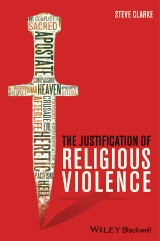Details
The Justification of Religious Violence
Blackwell Public Philosophy Series, Band 49 1. Aufl.
|
19,99 € |
|
| Verlag: | Wiley-Blackwell |
| Format: | EPUB |
| Veröffentl.: | 06.03.2014 |
| ISBN/EAN: | 9781118529768 |
| Sprache: | englisch |
| Anzahl Seiten: | 272 |
DRM-geschütztes eBook, Sie benötigen z.B. Adobe Digital Editions und eine Adobe ID zum Lesen.
Beschreibungen
<p>How are justifications for religious violence developed and do they differ from secular justifications for violence? Can liberal societies tolerate potentially violent religious groups? Can those who accept religious justifications for violence be dissuaded from acting violently? Including six in-depth contemporary case studies, <i>The Justification of Religious Violence</i> is the first book to examine the logical structure of justifications of religious violence.</p> <ul> <li>The first book specifically devoted to examining the logical structure of justifications of religious violence</li> <li>Seeks to understand how justifications for religious violence are developed and how or if they differ from ordinary secular justifications of violence</li> <li>Examines 3 widely employed premises used in religious justifications of violence – ‘cosmic war’, the importance of the afterlife, and ‘sacred values’</li> <li>Considers to what extent liberal democratic societies should tolerate who hold that their religion justifies violent acts</li> <li>Reflects on the possibility of effective policy measures to persuade those who believe that violent action is justified by religion, to refrain from acting violently</li> <li>Informed by recent work in psychology, cognitive science, neuroscience and evolutionary biology</li> <li>Part of the <i>Blackwell Public Philosophy Series</i></li> </ul>
<p>Preface ix</p> <p>1 Justification, Religion, and Violence 1</p> <p>2 Religion 27</p> <p>3 Morality 58</p> <p>4 Justifying Violence,War, and CosmicWar 89</p> <p>5 The Afterlife 114</p> <p>6 The Sacred 134</p> <p>7 Recent Justifications of Religious Violence 153</p> <p>8 Tolerance 183</p> <p>9 Reducing Religious Violence 198</p> <p>References 215</p> <p>Name Index 243</p> <p>Subject Index 251</p>
<p><b>Steve Clarke</b> is a Senior Research Fellow in the Centre for Applied Philosophy and Public Ethics at Charles Sturt University in Australia, and a Senior Research Associate of the Uehiro Centre for Practical Ethics at the University of Oxford. He has published over sixty academic papers and is the author of <i>Metaphysics and the Disunity of Scientific Knowledge</i> (1998), and co-editor of three books including <i>Religion, Intolerance and Conflict: a Scientific and Conceptual Investigation</i> (with Russell Powell and Julian Savulescu, 2013).</p>
<p>Do religious justifications for violence differ from secular justifications for violence? The relationship between religion and violence has long been the subject of intense discussion, and indeed, followers of many different religions have committed violent acts and attempted to justify them by appealing to their religious convictions. Rather than questioning whether religion causes violence, Clarke explores how religious justifications for violence develop and whether or not they differ from secular justifications of violence.</p> <p>Clarke demonstrates that many religiously based justifications for violence are as acceptable as rigorous secular justifications for violence, provided that crucial premises, which religion supplies, are accepted. Religious believers are able to incorporate premises, grounded in the metaphysics of religious world views, in arguments for the conclusion that particular violent acts are justified.</p> <p>This book considers whether and to what extent liberal democratic societies can and should tolerate religious believers who believe that they are justified by their religion in acting violently. In addition, it reflects on our prospects for developing effective policy measures to persuade those who believe that violent action is justified by religion to refrain from acting violently.</p>
<p>“How could anyone believe that they are justified in blowing up school busses or the World Trade Center? What role does religion play in their thinking? Steve Clarke illuminates these complex and controversial issues with clarity and balance. This important book is highly recommended for all of us who wonder about the relations between religion and violence.”</p> <p>—Walter Sinnott-Armstrong, Duke University</p> <p>“Avoiding big claims about religion causing violence, Steve Clarke argues that many religiously-based justifications for violence, far from being wildly irrational, are formally similar to those commonly offered as secular justifications. Clear, very readable, and thoroughly researched, the book makes a valuable contribution to one strand in the current debate about religion and violence.”</p> <p>—C.A.J. Coady, University of Melbourne<br /> <br /> </p> <p>"The heated debates over the relation between religion and violence that burst onto the world’s political and intellectual scene after 9/11 have spewed much foam and fury, but little fact or reason. Now, Stephen Clarke offers a sober yet humanistic analysis of how people justify violent acts in the name of religion, showing how historically and cross-culturally pervasive these justifications are. Mostly, secular and religious argument in support of violence proceeds much the same. The difference arises from three classes of premises that stem from religious metaphysics, and that transcend – and so resist contradiction by – empirical evidence and reason: appeal to cosmic war, the afterlife, sacred values, or some combination of these three. Religion thus outperforms the secular in arming violence, with conceptual resources both wider in scope and more resistant to challenge. Fortunately, Clarke also shows us how these same religious assets can be used to lessen violence and resolve even the most intractable conflicts: for example, through understanding and leveraging knowledge of sacred values, and learning how to reframe them, rather than by futilely trying to get opposing sides to ignore, abandon or compromise them."</p> <p>—Scott Atran, Directeur de Recherche, Anthropologie, CNRS / Ecole Normale Supérieure, Paris</p>



















